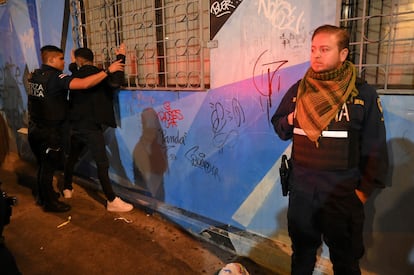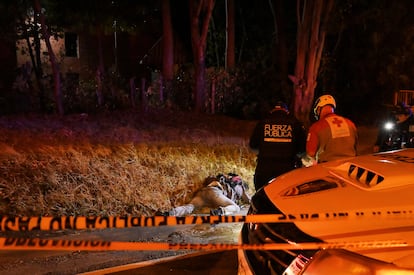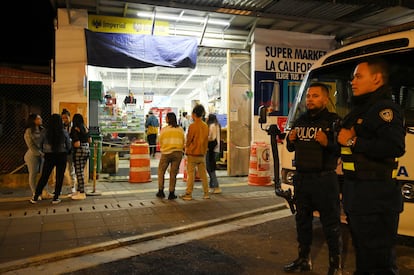Costa Rica’s peace is disturbed: Homicides have increased by 66% in the past decade
In the Central American country, crime is breaking records. There are more shootings in the streets and more collateral victims. Meanwhile, the Minister of Public Security has been criticized for asking the population to confront drug traffickers

Murders are no longer newsworthy in Costa Rica, as the word “shooting” becomes more and more frequent in the local media headlines. And homicides are no longer taking place just during the night. Recently, an armed attack took place at 9AM on a busy highway in the capital, San José.
Costa Rica – a country internationally recognized for its peaceful atmosphere – now has a homicide rate that is inconsistent with its reputation. In the last decade, murders have increased at a rate almost unlike any country in Latin America. There have even been recent attacks inside schools, or between schoolchildren.
The 2022 murder report was the highest in the country’s history: a figure 66.5% higher than that of 2012, for a record rate of 12.6 murders per 100,000 inhabitants. Meanwhile, the 2023 numbers already exceed the homicides that took place in the first three months of 2022 by 30%.
Disputes between criminal gangs – mostly dedicated to drug trafficking – are no longer confined to the marginal neighborhoods or the coastal regions, where cocaine passes from south to north. Over the past two decades, increases in poverty and inequality, budget cuts to the police force and the growing influence of international gangs have put Costa Rica against the ropes. While the Central American nation boasts of having abolished its army 75 years ago to dedicate resources to social investment, recent results haven’t been good.
Costa Rica is no longer just a transit point for the drug business or a territory of warehouses with small shipments of narcotics. It is now home to violent local gangs that no longer need the control of Mexican or Colombian cartels. Rather, these cartels are now their partners, clients or competitors.
There are now several networks of Costa Ricans who have learned to fight with bullets and blood to maintain or increase their illicit business, whose profits are increasingly camouflaged by the legal economy.
This landscape isn’t entirely new. The records of the last decade show that criminal groups have decimated each other, leading to one of the largest increases in homicides on the continent, according to a comparison published by the local weekly Universidad. The paper also notes that, in countries with greater histories of violence, there have been more notable improvements. But since September of 2022, Costa Rican President Rodrigo Chaves has said that the situation has gotten out of hand, as the wars between gangs have become totally unscrupulous.
It’s no longer rare for a person to hear gunshots from their home. On the last Sunday in February, Samuel Arroyo – an eight-year-old boy – was killed after being hit by a stray bullet from an AK-47, while he was sleeping in his room.
Arroyo – the son of a police officer – died in the same district of San José where the headquarters of the Presidency of the Republic is located. But it turns out that the detainee held responsible for the shooting was also a minor – a 15-year-old teenager – possibly related to one of the local groups that sell drugs to middlemen or consumers.

“It is outrageous, inexplicable and unacceptable,” President Chaves stated, referring to the murder of Arroyo. However, in 2022, it was he who denied responsibility for the insecurity crisis, arguing that, in May of that year, his government had barely started. He said that his numbers would begin to count at the beginning of 2023. Yet, this year has brought about even more violence than the previous one, appearing to overwhelm the executive branch.
This is why Chaves has chosen to blame the judicial system, offloading the task of legal reforms that he is pushing in the Legislative Assembly. His administration has also installed technology in the port of Limón – the country’s main port – to monitor cocaine shipments that are being smuggled to Europe.
The figures, however, are a rude awakening for a country that thrives on tourists, investors and digital nomads. Reported assaults rose by 19.5% between 2021 and 2022 – one every 49 minutes – home robberies went up by 15% – one every 80 minutes – and carjackings and the theft of shipping containers rose by 30% and 14% respectively. Murders are up by 11.7%, with one person being killed every 13 hours, according to figures from the Judicial Investigation Agency.
Two-thirds of Costa Rican homicides are linked to organized crime and 72% are from gunshots. Collateral damage has grown drastically. In 2021, there were seven collateral victims of intentional homicides. But in 2022, there were 18 – one every 20 days – making for an increase of 128%.
This year, so far, shows that these indicators are worsening. Jorge Torres — the minister of Public Security and former head of the Intelligence and Security Directorate – has been widely criticized for having candidly said in an interview that Costa Rican society is too domesticated. He said that, in local neighborhoods, residents should confront criminals and demand that they stop selling drugs.
Minister Torres said that he had done this himself in his neighborhood, confronting a man who “had an accent like a Colombian.” However, the vast majority of those arrested and prosecuted for drug-trafficking in Costa Rica are, in fact, Costa Rican citizens.
“There is no clear public policy [to address this]... but the country’s highest security officer is telling us that it’s the citizens’ fault for being too tame. It’s clear that they want to sell insecurity as the responsibility or fault of the citizenry,” scoffed Geison Valverde, an opposition deputy from the Caribbean province of Limón, where the homicide rate almost tripled the national average in 2022.

Given the limited response that different political and social sectors have attributed to the Chaves government, the president of the Legislative Assembly – Rodrigo Arias – decided to convene emergency meetings in March with experts and the authorities. Meanwhile, some deputies have been praising the strong-arm policies of President Nayib Bukele in El Salvador. Others are insisting on the need for actions within the democratic regime, without abandoning social programs.
“We have to attack the problem as quickly as possible to avoid more deaths and the deterioration of the country, because we’ll stop having a clean democracy… because these things attack democratic principles,” said Congresswoman Gloria Navas, president of the Commission on Legislative Security and Drug Trafficking. She also emphasized the risk of escalating crime taking a toll on the tourism industry.
The United States is the main country of origin for tourists to Costa Rica. The embassy in San José issued a reminder alert to its citizens on March 1, regarding the risks of insecurity in Costa Rica and the increase in violent crimes. This came just a week after President Chaves – in a televised appearance – visited the southern region of the country, escorted by heavily-armed guards… an unprecedented image in the country’s recent history.
“They threaten to kill me every day,” Chaves justified, attributing these threats to police actions against drug trafficking operations. However, there are no reported complaints or open investigations about these alleged threats.
Sign up for our weekly newsletter to get more English-language news coverage from EL PAÍS USA Edition
Tu suscripción se está usando en otro dispositivo
¿Quieres añadir otro usuario a tu suscripción?
Si continúas leyendo en este dispositivo, no se podrá leer en el otro.
FlechaTu suscripción se está usando en otro dispositivo y solo puedes acceder a EL PAÍS desde un dispositivo a la vez.
Si quieres compartir tu cuenta, cambia tu suscripción a la modalidad Premium, así podrás añadir otro usuario. Cada uno accederá con su propia cuenta de email, lo que os permitirá personalizar vuestra experiencia en EL PAÍS.
¿Tienes una suscripción de empresa? Accede aquí para contratar más cuentas.
En el caso de no saber quién está usando tu cuenta, te recomendamos cambiar tu contraseña aquí.
Si decides continuar compartiendo tu cuenta, este mensaje se mostrará en tu dispositivo y en el de la otra persona que está usando tu cuenta de forma indefinida, afectando a tu experiencia de lectura. Puedes consultar aquí los términos y condiciones de la suscripción digital.








































